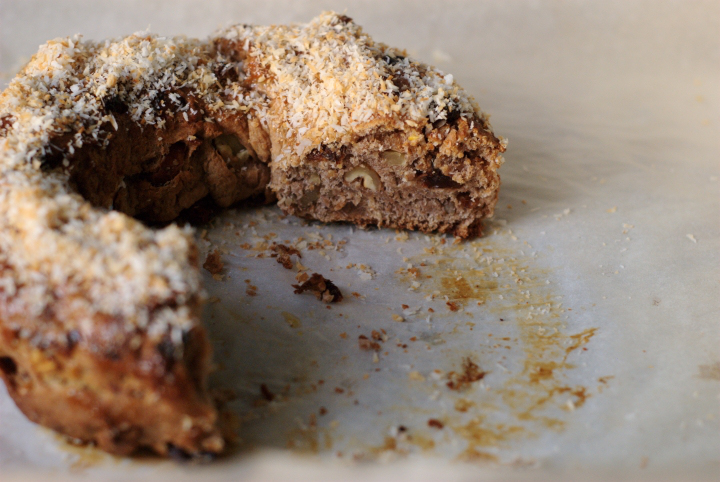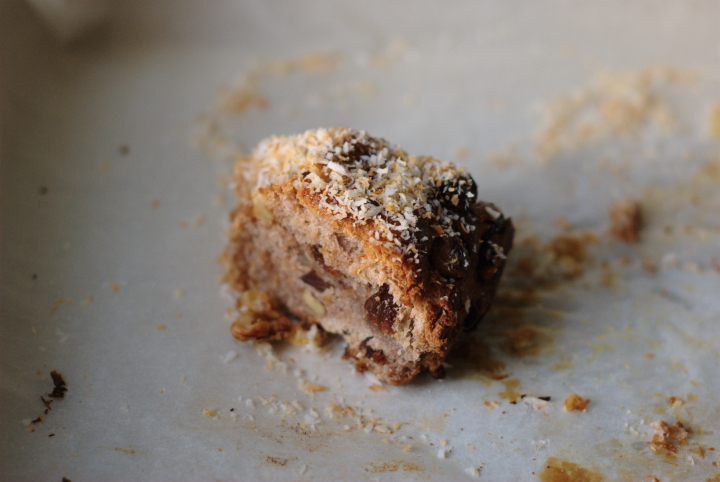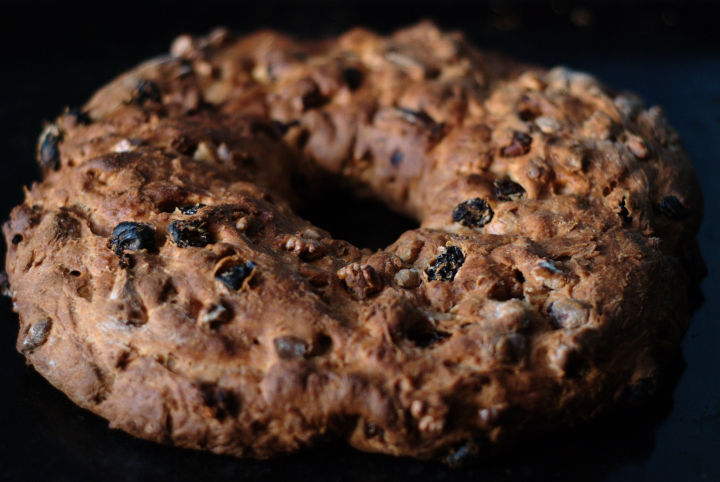Bolo-Rei
One of the most typical cakes eaten in Portugal around this time of the year is Bolo-Rei (“bolo” stands for cake, “rei” for king). It’s one of those cakes I always enjoyed eating since I was kid (even though it isn’t a kids-friendly type of cake) and now, as a grown-up, I decided to try to bake it myself. I did it yesterday and, even though the cake is a bit of a project (it’s yeast-based, so it has to rise two times), the end result is way better than its store-bought counterpart.
Firstly, I decided to bake two cakes, basing them on different recipes (which only varied slightly in terms of method and rising times). Then, I thought, “why-not-to-go-a-little-bit-further-with-this” and substituted sugar for agave nectar, butter for olive oil, eggs for tofu, and also added spelt flour to one of the doughs (while the other one was made only with regular flour). I was really satisfied with how both cakes came out : they had a soft and bread-like inside, filled with lots of nuts and dried fruits. I finished things off by covering them with a tangerine glaze and toasted shredded coconut. The recipe I’m sharing with you is the one in which I used 100% regular flour: not because it tasted better or anything (the cakes had a similar taste), just that it was the one I actually ended up taking notes of (anyway, I’m pretty sure you could sub half of the amount of regular flour called in the recipe for spelt or any other whole grain variety). Also, this time around I ended up measuring everything in grams, for which I apologise, even though I prefer to do it that way, especially when baking.
Bolo-Rei
(for one large cake)
Ingredients:
4 tablespoons (60 ml) agave nectar
4 tablespoons (60 ml) olive oil
100 grams tofu, crumbled
6 tablespoons (90 ml) soy milk, plus a few extra tablespoons
15 grams fresh yeast
250 grams regular flour
80 grams raisins
80 grams almonds, coarsely chopped
40 grams walnuts, coarsely chopped
55 grams dates (7 units), pitted and chopped
For the tangerine glaze:
freshly squeezed juice of 4 medium-sized tangerines
2 tablespoons (30 ml) agave nectar
1 teaspoon cornstarch
–––
2 to 3 tablespoons of shredded coconut, toasted
1. In a blender combine the first 4 ingredients and mix until smooth. In the meantime, dissolve the yeast in a few tablespoons (3 to 4) of slightly warm soy milk. Add the yeast mixture to the tofu mixture, and run the blender once again, until everything is well incorporated.
2. Sift the flour into a large bowl. Make a well in the middle and, gradually, add the liquid mixture. You’ll end up with a soft, sticky dough, which you want to knead for about 5 minutes (resist the urge to add more flour to it).
3. Transfer the dough to a slightly oiled large bowl, cover it with a clean towel, and leave it to rise in a warm place for about 2 hours or until doubled in size.
4. Once the dough has doubled in size, it’s time to add the chopped nuts (almonds and walnuts) and dried fruits (raisins and dates) to it. Knead the dough in the bowl for 1 minute, or until all the nuts and dried fruits are well incorporated into it.
6. Now, shape the dough into a log, joining the two ends together in order to form a crown. Transfer the cake to a large baking tray lined with parchment paper, cover it again with a clean towel and leave it to rise for additional 45 minutes.
7. Pre-heat the oven to 180ºC (375ºF).
8. Bake the cake in the lower third of the oven for about 30 minutes, or until it slightly browned (see picture above) on top.
9. To make the tangerine glaze, add the tangerine juice, 2 tablespoons agave nectar and 1 teaspoon of cornstarch to a small pan over medium heat, until it reduces and thickens up (do not forget to constantly whisk the mixture).
10. Once the cake is done, cover it with the glaze (you might end up having more than what you actually need) and sprinkle it with the shredded coconut.
Recipe inspired by Ingrediente Secreto, by Henrique Sá-Pessoa, published by Casa das Letras in 2011.



1 comment